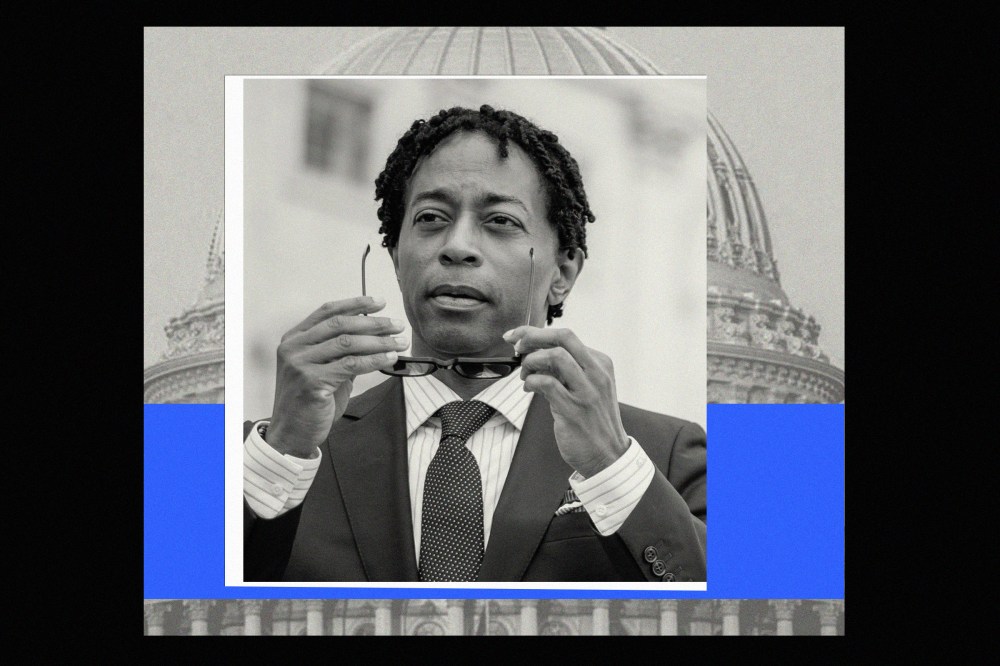This article is the second in a six-part MSNBC Daily series, “Meet the Freshmen,” featuring six of Congress’ newest faces — three Republicans and three Democrats — in a series of diverse columns that explore the new members’ backstories, policies, home districts and where they fit in this historic political moment. You can read the rest of the series here.
St. Louis County, Missouri, Prosecutor Wesley Bell made news in August when he defeated Rep. Cori Bush, a “squad” member, in a Democratic primary that many saw as a referendum on the party’s position on the Israel-Hamas war. Now he arrives in Washington to represent Missouri’s 1st Congressional District. And though he arrives with promise, Bell is trailed by questions about what he truly stands for, questions that more broadly plague his party.
Bell, 50, is a native of the relentlessly segregated St. Louis suburbs. He won a seat on the Ferguson City Council after a police officer killed teenager Michael Brown and the city convulsed with protests.
The New York Times took notice and profiled Bell — who had been a professor of criminal justice at a local community college — in a short documentary. “I actually think he’s going to be like President Obama,” one voter says in the film, predicting a congressional career “at the very least.”
Wesley Bell defeated Rep. Cori Bush in a Democratic primary that many saw as a referendum on the party’s position on the Israel-Hamas war.
Bell kept rising. In 2018, he unseated St. Louis County Prosecutor Robert McCulloch, who had earned the ire of the Black community, which charged him with not doing enough to hold Darren Wilson, the Ferguson police officer, accountable for Brown’s killing. (A grand jury declined to bring charges.) The national media again took note of Bell, who seemed to be in line with the burgeoning criminal justice reform movement. “People are awake to the need to address issues like mass incarceration, to address issues like profiling and to address criminal justice reform in general,” he told the Times.
In fact, Bell stayed in the center lane. Though his office reviewed the Wilson case, it never brought charges against the former officer, a huge disappointment to Bell’s supporters. (Bell said his office couldn’t prove Wilson had committed a crime in killing the unarmed teen.)
The decision not to prosecute Wilson wasn’t the only disappointment. As a report compiled by activists near the end of Bell’s tenure noted, the prison population of St. Louis continued to grow on his watch, despite the fact that, as a candidate, he seemed like he might favor decarceration. Nor had Bell made the sweeping reforms — in police accountability and sentencing, among other issues — his statements about criminal justice issues seemed to portend.

“We have seen the office fail to implement meaningful change on a number of important fronts,” the report said. “Many people were excited for new leadership in 2019 and remained hopeful after early change, only to see a return to the policies of mass incarceration.”
Politically, staying within the prosecutorial mainstream was a savvy move by Bell. He entirely avoided the backlash against progressive prosecutors that led voters in San Francisco to recall Chesa Boudin and, more recently, led voters in Los Angeles County to vote out George Gascón.
Meanwhile, in Washington, Bush, who also entered the political arena after Wilson killed Brown and in 2020 unseated 10-term incumbent William Lacy Clay, was on her way to becoming a progressive star. But as the “squad” grew larger, it also became more marginalized, turning into more of a media sensation than a political force. A 2021 vote against President Joe Biden’s $1.2 trillion bipartisan infrastructure bill may have been seen as principled by some on the left. But to the centrist Democrats who lead the party, it was a pointless show of defiance.
The Oct. 7, 2023, attacks caused a rift between centrists who supported Israel and pro-Palestinian progressives. Bush was firmly in the latter camp, calling for a ceasefire just days after the Hamas-led slaughter.
Jewish leaders in St. Louis — men and women she purportedly represented — asked Bush to temper her rhetoric, such as when she claimed that Israel was committing “ethnic cleansing,” charging in an open letter that she was “intentionally fueling antisemitism and hatred.” The congresswoman denied the accusation, declining to temper her criticism of the campaign in Gaza.












